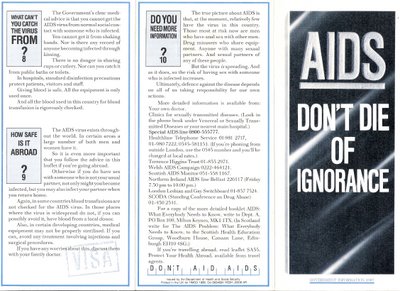

 The origins of the AIDS epidemic certainly pre-date the 1980s. There is still uncertainty about how or when this disease came into being, but with HIV's often lengthy gestation period, it is safe to say that some people were infected with the virus before the end of the 1970s.
The origins of the AIDS epidemic certainly pre-date the 1980s. There is still uncertainty about how or when this disease came into being, but with HIV's often lengthy gestation period, it is safe to say that some people were infected with the virus before the end of the 1970s.HIV and AIDS were not identified and named until the early 1980s, and I remember vague rumours drifting around that the disease had originally afflicted monkeys. On the internet, there is now much material about the possible origins of AIDS, including some conspiracy theories.
In England, many of us believed that AIDS mainly affected countries far distant, until the "Don't Die of Ignorance" TV campaign of 1986. This depressing piece, shown on ITV and the BBC, featured a couple in bed together (the actors asked not to be named, fearing that they would be associated with the virus) and a tomb!
In 1987, the Government's AIDS DON'T DIE OF IGNORANCE leaflet, pictured above, was sent to every household in the country.
By the time you read this, probably 300 people will have died in this country. It is believed that a further 30,000 carry the virus. This number is rising and will continue to rise unless we all take precautions...
On TV, AIDS was much discussed. ITV gave us First AIDS, hosted by Mike Smith. This was a first - the first programme where condoms were fiddled with and twanged on screen, and inflated by blowing into them.
At least one reader of the TV Times was upset by the programme:
So "First AIDS" (ITV and C4) claims to have had a studio audience made up of an "accurate cross-section of British youth of 16-25". Allowing this improbable claim to pass, what a tragedy that only one of those who spoke questioned the assumption underlying the whole programme that every young person should regard sex as a social act with no greater significance than swigging a pint of beer. Is a whole generation really allowing itself to be quite so badly ripped off? If the AIDS epidemic is worsened by heterosexual promiscuity, it's shameful to advise the young that they use contraception to help make casual sex safe. Where, in this programme, was the voice in support of the evidence that truly creative and satisfying lives are found inside committed, lifelong relationships based on love and trust; that promiscuity is an empty vessel that spells loneliness, superficial pleasure and, ultimately, despair? My anger at the hypocrisy of a programme that was little more than a 90-minute commercial for contraceptive manufacturers drives me to hope that that there will be a hell for the wicked - not for the wretched AIDS victims; but for the spiritual bankrupts who ran this sickening show.
The BBC and ITV, for a wonder, got together for an AIDS week. Spitting Image featured Willie Whitelaw, with a condom over his head.
There was also an ITV AIDS drama serial called Intimate Contact, which told the story of a married man, destined to die after a heterosexual encounter.
I joined the local AIDS Helpline. The set-up was based on the American model, with face-to-face befrienders ("Buddies") and helpline advisors. I acted as one of the latter.
I read many articles at the time about how AIDS was bringing back old values, that people were settling down into monogamous relationships at a young age. I saw no evidence of it amongst my peer group. We simply took precautions.












